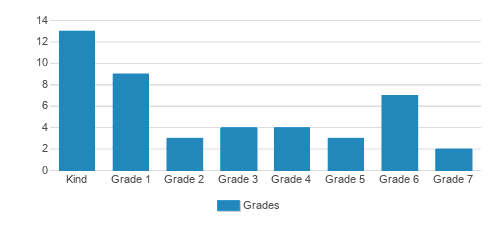High School all the way down to preschool age enjoys our beautiful modern outdoor and indoor spaces with Competency Based learning! Approved for attendance by the Department of Eduction.
We use Project Based protocols through PBL Works, Harvard Project Zero and the creative minds of our amazing staff to reach students.
Full time students will have a portfolio of their work for years to come while Mastery Transcripts will be available for all upper middle and high school students for college and work place needs! Woodworking, farm, wilderness & home economics are a big part of our world! Visit us for a tour and to pet the goats, chickens and corgis!.
Quick Facts (2026)
- School Type: School with Special Program Emphasis
- Grades: Prekindergarten-12
- Enrollment: 45 students
- Yearly Tuition: $12,000
- Acceptance rate: 70%
- Average class size: 14 students
- Application Deadline: None / Rolling
- Source: Verified school update
School Overview
School Type
School Membership(s)School Assoc.
Religious Affiliation
Grades Offered
Grades Prekindergarten-12
Offers Post-Graduate Year
Yes
ADD/ADHD Support
Yes
Learning Difference Programs
Yes
Year Founded
1987
Summer School Offered
Yes
Campus Size
120 acres
Student Body
Total Students
45 students
Student Body Type
Co-ed
% Students of Color
10%
State avg.: 18%
Students by Grade

Academics and Faculty
Total Classroom Teachers
14 teachers
Student-Teacher Ratio
3:1
National avg.: 11:1
% Faculty w/Advanced Degree
75%
Average Class Size
14 students
Classroom Dress Code
Casual
Confident and Comfortable alongside winter gear
Tuition and Acceptance Rate
Admission Deadline
None / Rolling
Yearly Tuition Cost
$12,000
Tuition Notes
Paid in three lump sums over the course of the year
Summer Program Cost
$350
% on Financial Aid
50%
Acceptance Rate
70%
National avg.: 82%
Admissions Director
Wren Hayes
Admissions Associate
David Hayes
Application URL
Endowment Size
$1.2 million
Sports
Total Sports Offered
4 sports
School Notes
- School Mascot: Goats
- Curriculum
- Theschool will carefully curate a cohort of 67 students who will be supported by 14 teachers throughout the school year as they use Project-Based Learning to explore the 6 Cs:
- CollaborationCommunicationContentCritical ThinkingCreative InnovationConfidence(As outlined in Becoming Brilliant by Kathy Hirsch-Pasek & Roberta Michnick Golinkoff)Within each of these 6 competencies are clusters of standards that are determined by the staff for each emergent project.
- The standards may reflect Common Core State Standards, local NH school district standards, as well as standards developed within the classroom community.
- These competencies are explored in three physical spaces within the school: Socratic Space, Tinker Lab, and Outdoor Classroom. Of course, learning does not only occur at school, and parents are welcome to add to the child`s digital portfolio at any time!
- What tools will be used to support the mastery of these
competencies?The staff's training on Project Based Learning (PBL)
comes from the PBL Works, the "gold standard" in PBL. One great
challenge to this kind of self-reflection work is that students
don't often practice thinking critically about these competencies.
Metacognition, or "thinking about thinking" needs to be taught and
frequently practiced. We will help students practice these skills
by doing structured protocols from Visible Thinking Routines in the
classroom (Harvard Project Zero). The teachers are trained to
initiate these routines throughout the day in order to encourage
higher-order thinking skills during real-life conversation among
peers.
Combining these protocols, conversations with students, teacher-created rubrics and real-time, authentic portfolios, a child's progress is able to be monitored and supported.
Source: Verified school update
Frequently Asked Questions
How much does Building Block Commons cost?
Building Block Commons's tuition is approximately $12,000 for private students and $350 for summer students.
What is the acceptance rate of Building Block Commons?
The acceptance rate of Building Block Commons is 70%, which is lower than the national average of 73%.
What sports does Building Block Commons offer?
Building Block Commons offers 4 interscholastic sports: Alpine Skiing, Climbing, Crew and Snowboarding.
When is the application deadline for Building Block Commons?
The application deadline for Building Block Commons is rolling (applications are reviewed as they are received year-round).
School Reviews
Endorse Building Block Commons. Endorsements should be a few sentences in length. Please include any comments on:
- Quality of academic programs, teachers, and facilities
- Availability of music, art, sports and other extracurricular activities
- Academic or athletic awards
Recent Articles

Private School Fees Increase Mid-Year: A Parent Action Plan
A 2026 parent action plan for managing mid-year private school tuition increases, including contracts, negotiation tips, and financial options.

Private School Scholarship Scams & Red Flags to Watch Out For (2026 Guide)
Learn how to spot private school scholarship scams in 2026, including red flags, real examples, and expert tips to protect families.

Diversity in Private Schools: Progress and Obstacles in 2026
Explore how private schools are advancing diversity in 2026, key gains made, ongoing challenges, and what families should know.









